|
|
|
Sort Order |
|
|
|
Items / Page
|
|
|
|
|
|
|
| Srl | Item |
| 1 |
ID:
144630
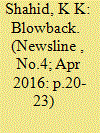

|
|
|
| 2 |
ID:
171970
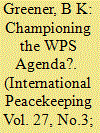

|
|
|
|
|
| Summary/Abstract |
This article draws on official sources to investigate how New Zealand interpreted its Women, Peace and Security obligations through the development and implementation of its first National Action Plan (NAP) in 2015. Existing beliefs that New Zealand was already a ‘world leader’ in this field yielded an unambitious document. Government agencies such as the New Zealand Police (NZ Police) and New Zealand Defence Force (NZDF) have gone on to make some gains under the narrow remit of the NAP, but resourcing and accountability are lacking. Moreover, this focus on perceived existing strengths, and the drawing of objectives from these, meant that New Zealand missed an opportunity to initiate the kind of deeper structural changes initially envisaged by WPS advocates. This article therefore closes with a discussion of how two broader processes – ‘re-gendering’ and ‘de-othering’ – could help New Zealand to better serve the original intent of the WPS agenda.
|
|
|
|
|
|
|
|
|
|
|
|
|
|
|
|
| 3 |
ID:
088847
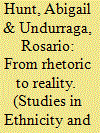

|
|
|
|
|
| Publication |
2009.
|
| Summary/Abstract |
This paper provides an overview of the current situation of Kosovo using a gendered perspective to highlight the challenges posed to the implementation of the National Action Plan for the Achievement of Gender Equality in Kosovo (NAP). The NAP arose through collaboration between the United Nations Development Fund for Women (UNIFEM) and the Kosovan women's movement and as such reflects both local and international gender knowledge and expertise. However, the current socio-political climate in Kosovo and its history of ethnic/religious conflict create significant difficulties that hinder the implementation of the NAP throughout all sections of society, and the subsequent achievement of gender equality. With this in mind, a contextualised assessment and discussion of the NAP is presented using feminist theory. Central to this is the recommendation that the incorporation of concrete steps stipulating how to achieve certain NAP objectives would contribute towards the successful achievement of gender equality in Kosovo.
|
|
|
|
|
|
|
|
|
|
|
|
|
|
|
|
| 4 |
ID:
184657
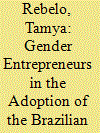

|
|
|
|
|
| Summary/Abstract |
On 8 March 2017, International Women’s Day, Brazil adopted a two-year National Action Plan (NAP) on Women, Peace and Security (WPS) with a clear commitment by the government for integrating gender perspectives in peace and security policies. With this decision, Brazil responded to the UN Security Council’s call for all Member States to develop national strategies to allow for successful implementation of Security Council Resolution 1325 (2000). Considering that it took almost two decades for Brazil to consider adopting its own plan, the driving forces behind this decision beg further exploration. This article draws on the concept of gender entrepreneurs to argue that the emergence of the Brazilian NAP was the result of an informal network of like-minded women, positioned inside and outside the government’s structures, who teamed up to harness political opportunities for change and push for the adoption of WPS global norms into a formal national commitment.
|
|
|
|
|
|
|
|
|
|
|
|
|
|
|
|
| 5 |
ID:
170262
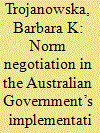

|
|
|
|
|
| Summary/Abstract |
The Australian National Action Plan on Women, Peace and Security (NAP) offers an apt example of norm negotiation in implementing United Nation Security Council Resolution 1325 (UNSCR 1325). Launched in 2012, the NAP is nearing completion due June 2019. The purpose of this article is to understand how far and in what ways the NAP has thus far supported the achievement of the transformative ambitions of the Women, Peace and Security (WPS) agenda to bring about greater gender equality for conflict-affected women. I argue that whilst this transformative agenda failed to diffuse vertically throughout the Australian NAP, this has simultaneously encouraged horizontal diffusion. That is, the sophisticated discourse on gender equality presented in the narrative part of the NAP did not translate into a robust framework for action (vertical diffusion). This failure has, however, allowed the WPS agenda to be negotiated within individual implementing agencies (horizontal diffusion). Through the juxtaposition of policy analysis with semi-structured interviews with NAP implementers, this article demonstrates that the lack of precision around the implementation strategy has—paradoxically—resulted in significant policy development on UNSCR 1325. Simultaneously, it has led to untargeted implementation, ultimately constraining the possibilities for meaningful impact on the ground.
|
|
|
|
|
|
|
|
|
|
|
|
|
|
|
|
| 6 |
ID:
144321
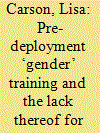

|
|
|
|
|
| Summary/Abstract |
In the area of peacekeeping training, Australia has a reputation of promoting ‘best practice’ internationally. Training for Australian police peacekeepers has been described by the United Nations as ‘one-of-a-kind’ and ‘a world-class model of best practice’. This article provides a case study of how gender training is conducted, and how ‘gender’ is understood from a critical feminist perspective. This article focuses only on the pre-deployment training stage and is informed by confidential interviews with staff from the Australian Federal Police and the Australian Defence Force, as well as observing training in 2013–14. The findings suggest that the training is inadequate because it is not carried out for all peacekeeping personnel, despite international and national requirements to do so. In addition, the findings suggest that ‘gender’ is understood in a very limited way that does not problematise power relations between the sexes and is only covered as a way of understanding the peacekeeping context, and not in relation to the attitudes and behaviours of peacekeepers themselves. This raises the question of whether and how other troop-contributing countries conduct the training and to what standard, given the documented problems of Australia's supposedly ‘best-practice’ training.
|
|
|
|
|
|
|
|
|
|
|
|
|
|
|
|
| 7 |
ID:
160129
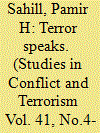

|
|
|
|
|
| Summary/Abstract |
This article, employing a poststructuralist Critical Discourse Analysis, reveals cracks, discrepancies, and inconsistencies in Pakistan's discourse on terrorism and practice. I argue that Pakistan continuously constructs a “monstrous enemy” and magnifies it in a way that conceals alternative representations of reality that could show that the state, by presenting itself as a victim of terrorism, is using phenomena of political violence to serve its political objectives inside and outside the boundaries of the state. The article argues that after a militant attack on a school in northwest Pakistan, critical, liberal, and dissenting narratives mingled with the dominant state discourse in a fashion that strengthen illiberal practices in the country, thus undermining the ideals of democracy.
|
|
|
|
|
|
|
|
|
|
|
|
|
|
|
|
|
|
|
|
|